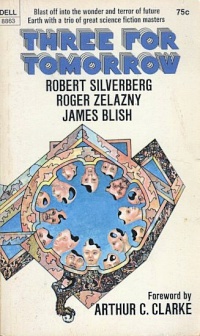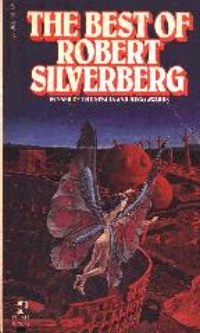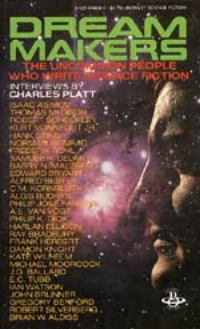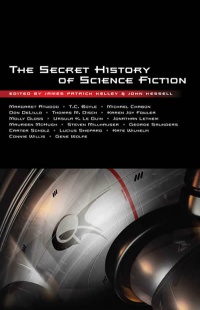The trouble with modern life, Bryce thought, is that technology gives us the potential for newer and more intricate disasters every year, but doesn’t seem to give us the ability to ward them off.
Title: Three For Tommorrow: Three Original Novellas of Science Fiction
Authors: Robert Silverberg, Roger Zelazny, James Blish
Year: 1969
Rating: 3/5 stars
 This nifty little volume contains three novellas by three well-known SF writers — but not just any random novellas. These three pieces are the result of an interesting literary project, and they were written especially for this purpose. To be more specific: the authors were presented with a short essay written by Arthur C. Clarke setting forth a general theme for a story, and then those authors took that theme and did what they do best: they wrote a story based on Clarke’s essay, attempting to work within that framework while interpreting it in their own different ways, filtering it through their own unique imaginations. As it turns out, none of these three novellas are remotely similar to each other; and only one (Silverberg’s) seems to me to be a good fit for the concepts laid out by Clarke. That in itself doesn’t mean the other stories are bad. It simply means that this little literary experiment wasn’t quite as successful as it could have been. I liked two out of the three novellas, so hey, I can’t complain too much.
This nifty little volume contains three novellas by three well-known SF writers — but not just any random novellas. These three pieces are the result of an interesting literary project, and they were written especially for this purpose. To be more specific: the authors were presented with a short essay written by Arthur C. Clarke setting forth a general theme for a story, and then those authors took that theme and did what they do best: they wrote a story based on Clarke’s essay, attempting to work within that framework while interpreting it in their own different ways, filtering it through their own unique imaginations. As it turns out, none of these three novellas are remotely similar to each other; and only one (Silverberg’s) seems to me to be a good fit for the concepts laid out by Clarke. That in itself doesn’t mean the other stories are bad. It simply means that this little literary experiment wasn’t quite as successful as it could have been. I liked two out of the three novellas, so hey, I can’t complain too much.
The essential core of Clarke’s essay goes something like this:
With increasing technology goes increasing vulnerability; the more Man “conquers” (sic) Nature, the more prone he becomes to artificial catastrophe. The last few years have brought a series of previews: the Torrey Canyon oil tanker and the Santa Barbara oil slick, the blackout of the northeastern United States, the thalidomide disaster….
To which we, several decades later, could add many more examples: Chernobyl, Bhopal, Three Mile Island, the Exxon Valdez, etc etc……
Clarke continues, focusing the concept a bit more:
But the most terrifying prospects are those which involve psychological, not just technological, factors. Remember the “Mad Bomber” of the New York subway. Think of all the airliners that have been destroyed by explosives in the baggage compartment. And don’t forget that clean-cut, all-American sniper in the University of Texas clocktower.
How is the society of the future going to protect itself from an increasing spectrum of ever more horrendous disasters, particularly those made possible by new devices (high powered lasers? drugs??) in the hands of madmen? To put the matter in one sentence: When will some Lee Harvy Oswald attempt to assassinate a city — or a world?
In “How It Was When the Past Went Away,” Silverberg really takes Clarke’s essay to heart, even zeroing in on the word “drugs” as his takeoff point. His story involves terrorists who unleash massive amounts of memory-erasing drugs into a large city’s water supply, and the effects on the city’s people. This is an all-too-realistic (not to mention all-too-scary) scenario, but it’s not the only way Silverberg scores here. He also presents a financial situation, centered around a “Credit Epidemic,” that seems eerily similar to today’s world. And one of the characters seems predictive of the modern popularity of bottle water:
He was not unaware of the little smiles they gave him when he admitted that he drank only bottle spring water, but he didn’t mind; he had outlived many of the smilers already, and attributed his perfect health to his refusal to touch the polluted, contaminated water that most other people drank.
Zelazny offers “The Eve of RUMOKO,” about a project to use artificial underwater volcanoes to create new islands for a growing population, and about the sabotage attempts aimed at it, since not everyone agrees it’s a good idea, or a safe one. And as it turns out, it’s not safe, and disaster ensues. However, that part of the story seems more like a background setting for the more interesting part. In this future world, your identity is totally defined by the information that exists about you in the Central Database. One man who helped set up the system decides to opt out, to live “off the grid.” He erases all his computerized information, so he doesn’t exist. On the other hand, he can input any information he wants (via a secret backdoor in the program), so he can be anybody he wants. He uses this ability to live as a sort of freelance secret agent, and this is very entertaining since he is endowed with the kind of irreverent and sarcastic wit that is common to Zelazny characters.
The Blish story, “We All Die Naked,” is rather disappointing. The disaster angle here is a generalized environmental decay caused by humanity trashing the planet. Against this backdrop we see a small group of people figuring out that a tipping point has been reached, and that the end of the world is imminent. The various characters face the end, singly or together, bravely or cowering, and the world crumbles, and they die, and that’s that. I’m not complaining about the pessimism there, only the style (or lack thereof) with which it was presented. This story was a dull read.
But as I said, two out of three ain’t bad. I like the concept behind this book, and I hope to find more like it.
















